外研版(2019)必修第二册Unit 4 Stage and Screen Using language Grammar 课件(共24张PPT)
文档属性
| 名称 | 外研版(2019)必修第二册Unit 4 Stage and Screen Using language Grammar 课件(共24张PPT) | 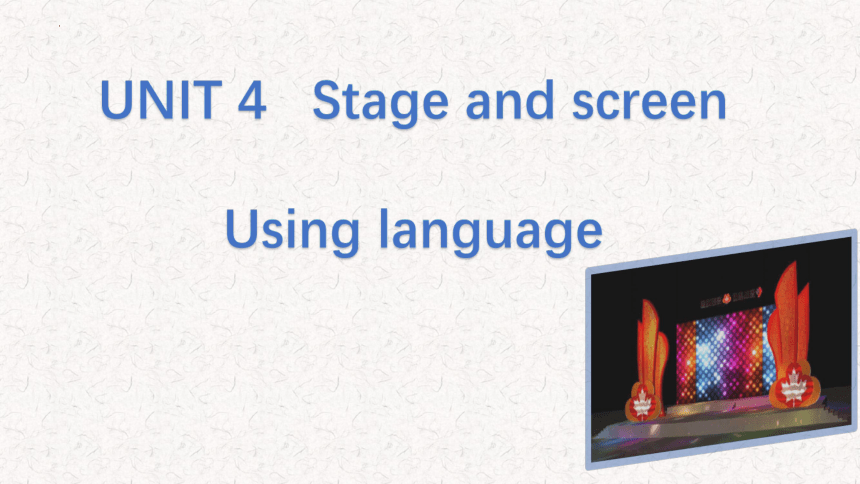 | |
| 格式 | pptx | ||
| 文件大小 | 3.6MB | ||
| 资源类型 | 教案 | ||
| 版本资源 | 外研版(2019) | ||
| 科目 | 英语 | ||
| 更新时间 | 2024-04-24 18:15:04 | ||
图片预览

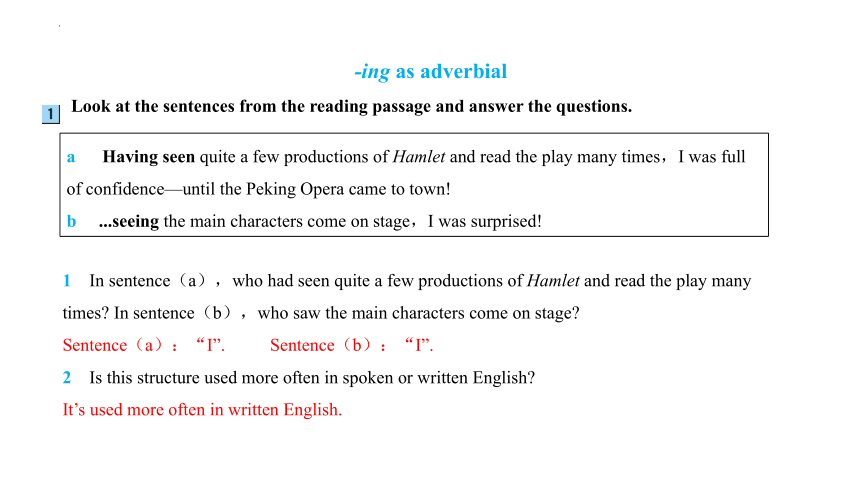
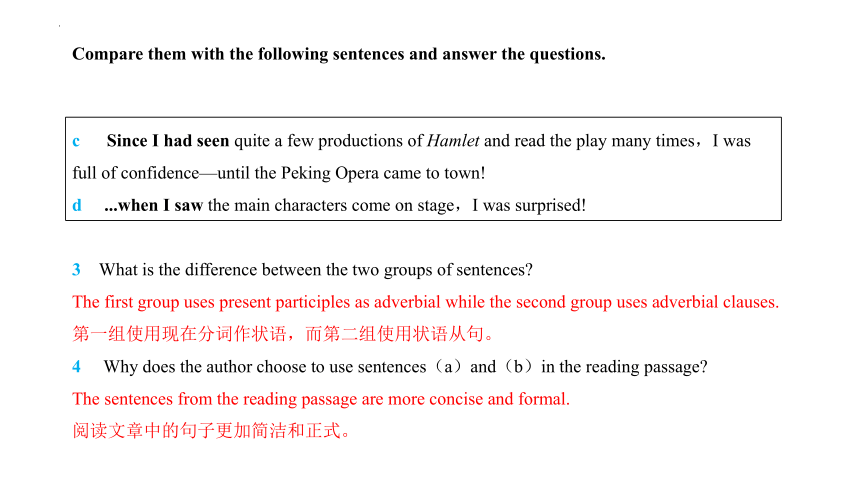
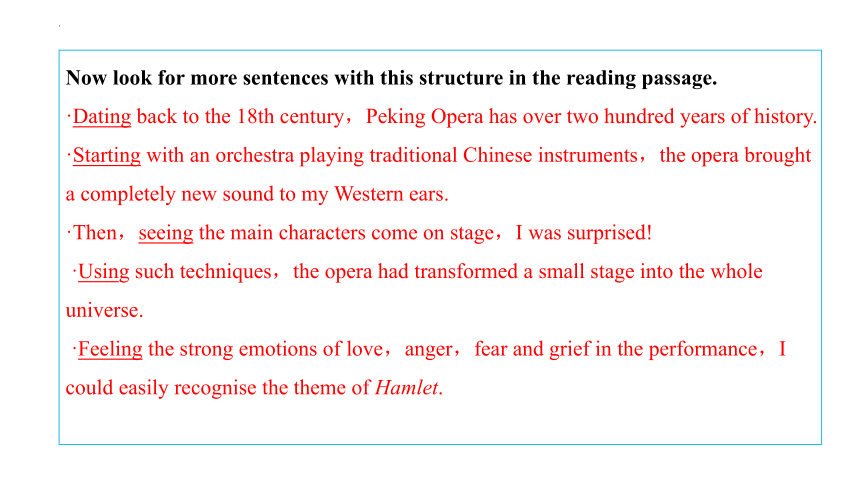
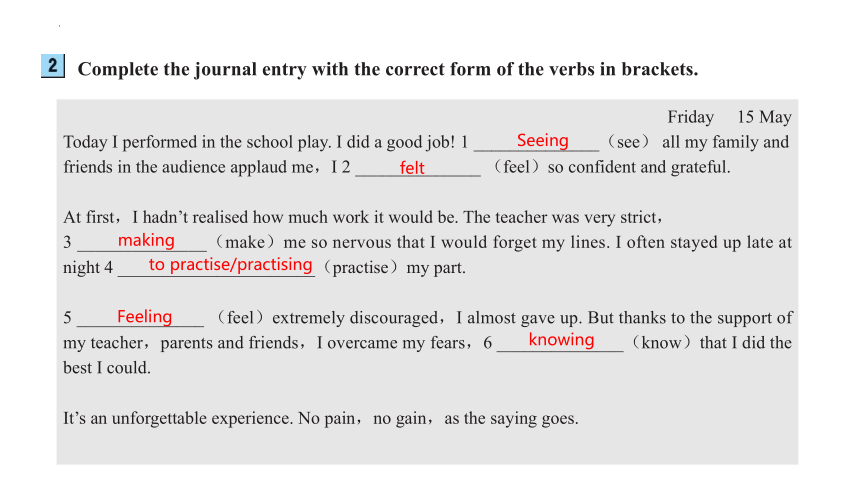
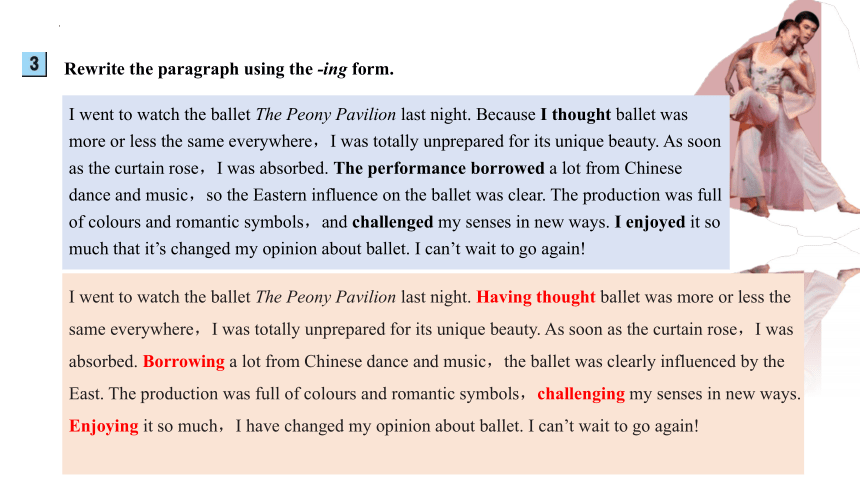
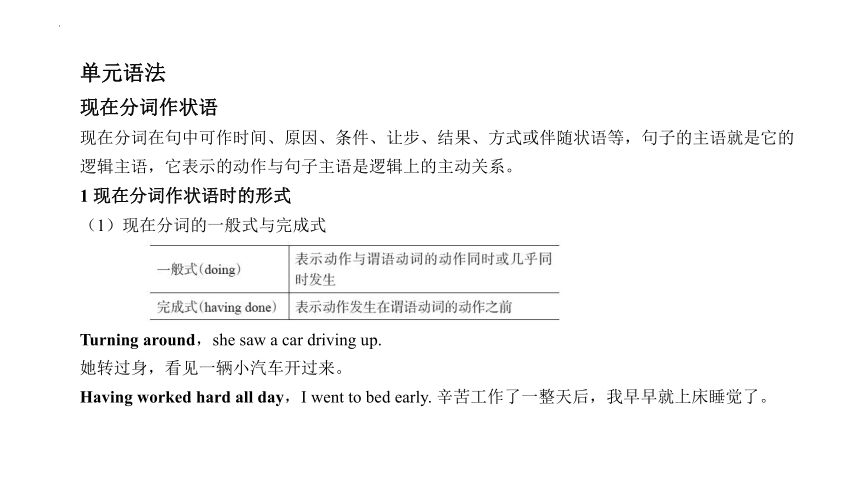
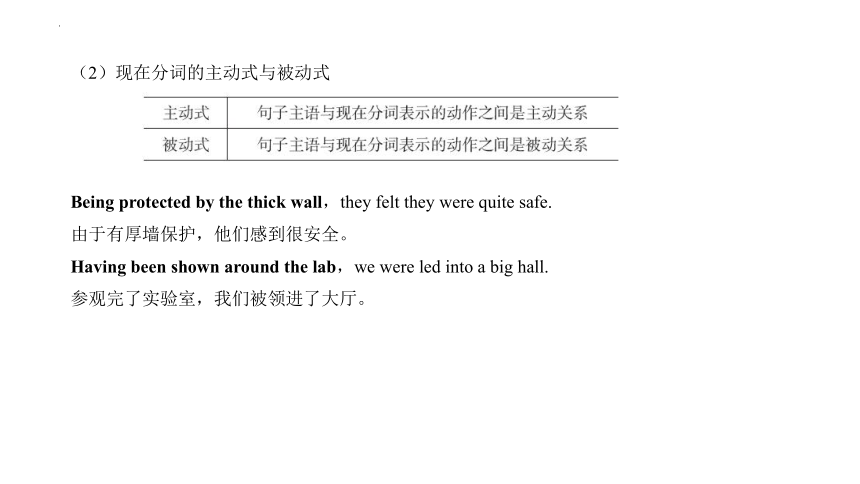
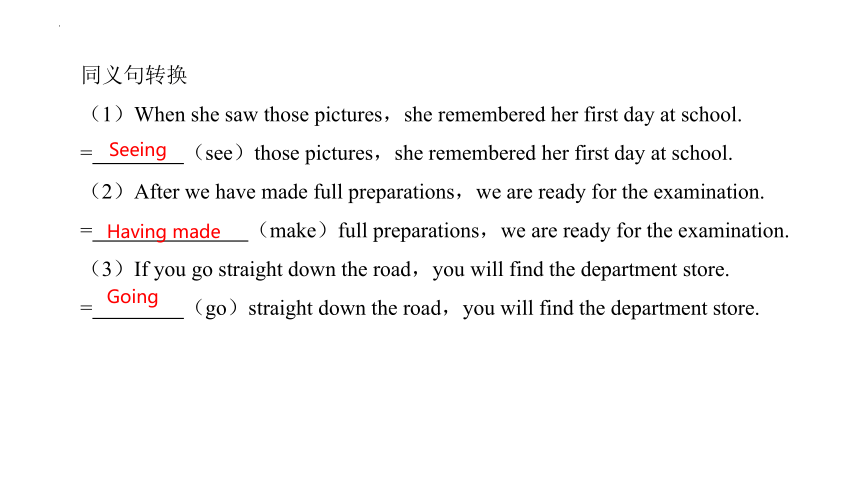
文档简介
(共24张PPT)
UNIT 4 Stage and screen
Using language
-ing as adverbial
Look at the sentences from the reading passage and answer the questions.
a Having seen quite a few productions of Hamlet and read the play many times,I was full of confidence—until the Peking Opera came to town!
b ...seeing the main characters come on stage,I was surprised!
1 In sentence(a),who had seen quite a few productions of Hamlet and read the play many times In sentence(b),who saw the main characters come on stage
Sentence(a):“I”. Sentence(b):“I”.
2 Is this structure used more often in spoken or written English
It’s used more often in written English.
Compare them with the following sentences and answer the questions.
c Since I had seen quite a few productions of Hamlet and read the play many times,I was full of confidence—until the Peking Opera came to town!
d ...when I saw the main characters come on stage,I was surprised!
3 What is the difference between the two groups of sentences
The first group uses present participles as adverbial while the second group uses adverbial clauses.
第一组使用现在分词作状语,而第二组使用状语从句。
4 Why does the author choose to use sentences(a)and(b)in the reading passage
The sentences from the reading passage are more concise and formal.
阅读文章中的句子更加简洁和正式。
Now look for more sentences with this structure in the reading passage.
·Dating back to the 18th century,Peking Opera has over two hundred years of history.
·Starting with an orchestra playing traditional Chinese instruments,the opera brought a completely new sound to my Western ears.
·Then,seeing the main characters come on stage,I was surprised!
·Using such techniques,the opera had transformed a small stage into the whole universe.
·Feeling the strong emotions of love,anger,fear and grief in the performance,I could easily recognise the theme of Hamlet.
Complete the journal entry with the correct form of the verbs in brackets.
Friday 15 May
Today I performed in the school play. I did a good job! 1 ______________(see) all my family and friends in the audience applaud me,I 2 ______________ (feel)so confident and grateful.
At first,I hadn’t realised how much work it would be. The teacher was very strict,
3 ______________(make)me so nervous that I would forget my lines. I often stayed up late at night 4 ______________________(practise)my part.
5 ______________ (feel)extremely discouraged,I almost gave up. But thanks to the support of my teacher,parents and friends,I overcame my fears,6 ______________(know)that I did the best I could.
It’s an unforgettable experience. No pain,no gain,as the saying goes.
Seeing
felt
making
to practise/practising
Feeling
knowing
Rewrite the paragraph using the -ing form.
I went to watch the ballet The Peony Pavilion last night. Because I thought ballet was more or less the same everywhere,I was totally unprepared for its unique beauty. As soon as the curtain rose,I was absorbed. The performance borrowed a lot from Chinese dance and music,so the Eastern influence on the ballet was clear. The production was full of colours and romantic symbols,and challenged my senses in new ways. I enjoyed it so much that it’s changed my opinion about ballet. I can’t wait to go again!
I went to watch the ballet The Peony Pavilion last night. Having thought ballet was more or less the same everywhere,I was totally unprepared for its unique beauty. As soon as the curtain rose,I was absorbed. Borrowing a lot from Chinese dance and music,the ballet was clearly influenced by the East. The production was full of colours and romantic symbols,challenging my senses in new ways. Enjoying it so much,I have changed my opinion about ballet. I can’t wait to go again!
单元语法
现在分词作状语
现在分词在句中可作时间、原因、条件、让步、结果、方式或伴随状语等,句子的主语就是它的逻辑主语,它表示的动作与句子主语是逻辑上的主动关系。
1 现在分词作状语时的形式
(1)现在分词的一般式与完成式
Turning around,she saw a car driving up.
她转过身,看见一辆小汽车开过来。
Having worked hard all day,I went to bed early. 辛苦工作了一整天后,我早早就上床睡觉了。
(2)现在分词的主动式与被动式
Being protected by the thick wall,they felt they were quite safe.
由于有厚墙保护,他们感到很安全。
Having been shown around the lab,we were led into a big hall.
参观完了实验室,我们被领进了大厅。
同义句转换
(1)When she saw those pictures,she remembered her first day at school.
= (see)those pictures,she remembered her first day at school.
(2)After we have made full preparations,we are ready for the examination.
= (make)full preparations,we are ready for the examination.
(3)If you go straight down the road,you will find the department store.
= (go)straight down the road,you will find the department store.
Seeing
Having made
Going
2 现在分词作状语的用法
(1)现在分词作时间状语
现在分词作时间状语,相当于时间状语从句,有时可在前面加上when 或while 表示强调。
Seeing the old photos(=when I saw the old photos),I remembered my childhood.
看到这些旧照片,我想起了我的童年。
When reading the newspaper,I heard the doorbell ring. 看报纸时,我听见门铃响了。
She picked up a few German phrases while staying in Berlin.
她在柏林逗留期间学会了几句德语。[词汇复现]
(2)现在分词作原因状语
现在分词作原因状语,相当于原因状语从句。
Not knowing his address(=Because I don’t know his address), I can’t send this book to him.
因为不知道他的地址,所以我无法把这本书寄给他。
Being ill,he could not walk any farther. 因为生病,他再也走不动了。
(3)现在分词作条件状语
现在分词作条件状语,相当于条件状语从句。
Being more careful(=If you are more careful),you will make fewer mistakes. 如果再细心点儿,你就会少犯错误。
(4)现在分词作让步状语
现在分词作让步状语,相当于让步状语从句,有时现在分词(短语) 前可带有连词although,even if,even though 等。
Knowing all this(=Although they knew all this),they made me pay for the damage.
尽管知道了这一切,他们还是要我赔偿损失。
(5)现在分词作结果状语
现在分词作结果状语表示必然的结果,通常放在句末。有时为了突出结果,现在分词前可加thus,相当于so 或so that 引导的结果状语从句。
Group activities were organized after class,building up children’s team spirit.
课后组织集体活动,培养了孩子们的团队精神。
【学法点拨】 不定式作结果状语时,常与only,never 连用,表示一种出乎意料的结果。
The actor intended to leave quickly,only to be surrounded by his fans.
这位演员本打算很快离开,结果却被他的影迷们包围了。
(6)现在分词作方式或伴随状语
现在分词作方式或伴随状语,说明谓语动词所表示的动作发生的方式、背景或情况。不能用状语从句替换,但常可转换成并列成分。
Using his skis,Nicholas built a snow cave. 尼古拉斯用他的滑雪板建了一个雪洞。
I stood by the door,not daring to say a word. 我站在门旁,不敢说一句话。
(7)现在分词作评论性状语
有些现在分词(短语)用于句首,没有逻辑主语而独立存在,作为句子的独立成分来修饰全句,表明说话者的态度、观点等,这被称为评论性状语或评注性状语。常见的有:
generally speaking 一般说来 roughly speaking 大致说来
frankly speaking 坦率地说 judging from/by 由……判断
considering... 考虑到…… supposing... 如果……
providing... 如果…… assuming... 假设……
Roughly speaking,I’d say we need about $500. 粗略地说,我认为我们大约需要500 美元。
Frankly speaking,I think this whole situation is ridiculous. 坦率地说,我认为这整个局面很可笑。
单句语法填空
(1)While (approach)the crossroads, you must be careful.
(2) (finish)his summary,he went out for a walk.
(3) (spend)nearly all his money,the employee couldn’t afford to stay at a hotel.
(4) (be)ill,he couldn’t book the flight.
(5)Pressed from his parents,and (realize)that he has wasted too much time, the boy is determined to stop playing video games.
(6) (eat)at the cafeteria before,Tina didn’t want to eat there again.
(7) (turn) to the right,you will find a path.
(8) (try) many times,he still couldn’t overcome the difficulties.
approaching
Having finished
Having spent
Being
realizing
Having eaten
Turning
Having tried
(9)He got up late and hurried to his office, (leave)the breakfast untouched.
(10)Newly-built wooden cottages line the street, (turn)the old town into a dream-land.
(11)George returned after the war,only (tell)that his wife had left him.
(12)There is no greater pleasure than lying on my back in the middle of the grassland,__________ (stare)at the night sky.
(13)Morris lay on the grass (feel) depressed about this whole situation.
(14)Mother drew the curtain, (block) out the bright sunlight.
完成句子
(15) (一般说来),children are naturally curious.
(16) (从外表判断), it is very peaceful,but in fact,a war will break out soon.
(17) (考虑到预算), we have decided to give up the travel plan.
(18) (坦率地说),the resources in the world are very limited.
leaving
turning
to be told
staring
feeling
blocking
Generally speaking
Judging from/by the appearance
Considering the budget
Frankly speaking
3 现在分词构成的独立主格结构
现在分词作状语时,其逻辑主语与句子的主语应该一致,否则,现在分词应有自己的逻辑主语,构成独立主格结构。独立主格结构通常用来表示伴随的动作或情况,有时还可以表示时间、原因、条件或解释整个句子。
The situation getting worse,they had to ask for help. 情况越来越糟,他们不得不求助。
Time permitting,we shall go there on foot.如果时间允许,我们将步行去那里。
We explored the big cave,Tony acting as our guide. 我们探索了那个大洞穴,托尼做我们的向导。
单句语法填空
(1)The meeting (be)over,we all went to the canteen.
(2)There (be)no taxi,we walked to the corporation.
(3)Time (permit),we’ll wander around the mall.
being
being
permitting
Types of TV programme
Look at the pictures and answer the questions.
1 What do you know about these types of TV programme
They are popular among the audiences.
2 Can you think of some examples of each type
Cartoon:Cartoons are usually popular with children.
Superman Spiderman
Tom and Jerry Pleasant Goat and Big Big Wolf
Little Tadpoles Looking for Mummy Calabash Brothers
Havoc in Heaven The Monkey King
Black Cat Sheriff
News programme:It is a serious programme. CCTV News
Talent show:It is a programme that discovers talent.
America’s Got Talent 《美国达人秀》 China’s Got Talent
Comedy:It’s humorous and can make people laugh.
Lost in Thailand
Nature documentary:It helps people learn about facts about nature.
Born in China
Talk show:It discusses some topics that interest the audience.
Day Day Up
《天天向上》是 湖南卫视 推出的娱乐脱口秀节目,节目以传承中华礼仪文化和倡导社会公德为主旨,每期邀请演艺明星和社会特色群体以及企业界的知名人士作为嘉宾参与访谈和表演。
中文名: 天天向上
Read and match the descriptions to the types of TV programme in Activity 4. Underline the words and expressions describing them.
□ 1 I absolutely loved last night’s episode of Best Singer! It was very exciting and totally unforgettable. Each of the contestants put on a wonderful performance—they all really wanted to win! The final winner was so talented.
□ 2 The Real Lives of Leopards—what an amazing programme! Leopards are such appealing creatures and the cubs are adorable! Incredible photography of them in the wild. Highly recommended!
□ 3 I used to love A Good Laugh and I watched it every week. It was so popular,but now it’s got really boring. The jokes aren’t funny at all. What a waste of time! I’m going to delete it from my favourites list.
□ 4 Monkey King:Hero is Back is my favourite! The Monkey King is really cool,and definitely a hero to me! I also enjoy the creative plot and settings. The writers and artists have such great imaginations. I’m thrilled to see Chinese culture presented in such an amazing and magical way.
□ 5 I like to know what’s going on in the world first thing in the morning,so I never miss this programme! It has all the headlines and market information you could possibly need. And there’s a handy traffic report,too!
□ 6 I watched Talk King last night,but I didn’t like it. What a rude person the host was! He hardly let his guests say a word! It’s a wonder they didn’t walk out of the studio.
c
e
d
a
b
f
Read and match the descriptions to the types of TV programme in Activity 4. Underline the words and expressions describing them.
□ 1 I absolutely loved last night’s episode of Best Singer! It was very exciting and totally unforgettable. Each of the contestants put on a wonderful performance—they all really wanted to win! The final winner was so talented.
□ 2 The Real Lives of Leopards—what an amazing programme! Leopards are such appealing creatures and the cubs are adorable! Incredible photography of them in the wild. Highly recommended!
□ 3 I used to love A Good Laugh and I watched it every week. It was so popular,but now it’s got really boring. The jokes aren’t funny at all. What a waste of time! I’m going to delete it from my favourites list.
□ 4 Monkey King:Hero is Back is my favourite! The Monkey King is really cool,and definitely a hero to me! I also enjoy the creative plot and settings. The writers and artists have such great imaginations. I’m thrilled to see Chinese culture presented in such an amazing and magical way.
□ 5 I like to know what’s going on in the world first thing in the morning,so I never miss this programme! It has all the headlines and market information you could possibly need. And there’s a handy traffic report,too!
□ 6 I watched Talk King last night,but I didn’t like it. What a rude person the host was! He hardly let his guests say a word! It’s a wonder they didn’t walk out of the studio.
Work in pairs. Talk about your favourite TV programme using the words and expressions you have learnt.
A:What’s your favourite TV programme
B:My favourite TV programme is... It’s a...
A:Why do you like it
...
Watching a performance
Did You Know
Dating back to the 1970s,Glastonbury Festival is a music and arts festival that takes place on a large farm in Somerset in South-west England. Most of the organisers are volunteers and much of the money raised from ticket sales goes to charity. Many famous bands have performed at the festival over the years,and the number of people attending has grown to about 200,000.
格拉斯顿伯里音乐节可以追溯到20世纪70年代,是一个音乐和艺术节,在英格兰西南部萨默塞特郡的一个大农场举行。大多数组织者都是志愿者,从门票销售中筹集的大部分资金都捐给了慈善机构。多年来,许多著名乐队都在音乐节上表演,出席人数已增至约20万。
THE END
UNIT 4 Stage and screen
Using language
-ing as adverbial
Look at the sentences from the reading passage and answer the questions.
a Having seen quite a few productions of Hamlet and read the play many times,I was full of confidence—until the Peking Opera came to town!
b ...seeing the main characters come on stage,I was surprised!
1 In sentence(a),who had seen quite a few productions of Hamlet and read the play many times In sentence(b),who saw the main characters come on stage
Sentence(a):“I”. Sentence(b):“I”.
2 Is this structure used more often in spoken or written English
It’s used more often in written English.
Compare them with the following sentences and answer the questions.
c Since I had seen quite a few productions of Hamlet and read the play many times,I was full of confidence—until the Peking Opera came to town!
d ...when I saw the main characters come on stage,I was surprised!
3 What is the difference between the two groups of sentences
The first group uses present participles as adverbial while the second group uses adverbial clauses.
第一组使用现在分词作状语,而第二组使用状语从句。
4 Why does the author choose to use sentences(a)and(b)in the reading passage
The sentences from the reading passage are more concise and formal.
阅读文章中的句子更加简洁和正式。
Now look for more sentences with this structure in the reading passage.
·Dating back to the 18th century,Peking Opera has over two hundred years of history.
·Starting with an orchestra playing traditional Chinese instruments,the opera brought a completely new sound to my Western ears.
·Then,seeing the main characters come on stage,I was surprised!
·Using such techniques,the opera had transformed a small stage into the whole universe.
·Feeling the strong emotions of love,anger,fear and grief in the performance,I could easily recognise the theme of Hamlet.
Complete the journal entry with the correct form of the verbs in brackets.
Friday 15 May
Today I performed in the school play. I did a good job! 1 ______________(see) all my family and friends in the audience applaud me,I 2 ______________ (feel)so confident and grateful.
At first,I hadn’t realised how much work it would be. The teacher was very strict,
3 ______________(make)me so nervous that I would forget my lines. I often stayed up late at night 4 ______________________(practise)my part.
5 ______________ (feel)extremely discouraged,I almost gave up. But thanks to the support of my teacher,parents and friends,I overcame my fears,6 ______________(know)that I did the best I could.
It’s an unforgettable experience. No pain,no gain,as the saying goes.
Seeing
felt
making
to practise/practising
Feeling
knowing
Rewrite the paragraph using the -ing form.
I went to watch the ballet The Peony Pavilion last night. Because I thought ballet was more or less the same everywhere,I was totally unprepared for its unique beauty. As soon as the curtain rose,I was absorbed. The performance borrowed a lot from Chinese dance and music,so the Eastern influence on the ballet was clear. The production was full of colours and romantic symbols,and challenged my senses in new ways. I enjoyed it so much that it’s changed my opinion about ballet. I can’t wait to go again!
I went to watch the ballet The Peony Pavilion last night. Having thought ballet was more or less the same everywhere,I was totally unprepared for its unique beauty. As soon as the curtain rose,I was absorbed. Borrowing a lot from Chinese dance and music,the ballet was clearly influenced by the East. The production was full of colours and romantic symbols,challenging my senses in new ways. Enjoying it so much,I have changed my opinion about ballet. I can’t wait to go again!
单元语法
现在分词作状语
现在分词在句中可作时间、原因、条件、让步、结果、方式或伴随状语等,句子的主语就是它的逻辑主语,它表示的动作与句子主语是逻辑上的主动关系。
1 现在分词作状语时的形式
(1)现在分词的一般式与完成式
Turning around,she saw a car driving up.
她转过身,看见一辆小汽车开过来。
Having worked hard all day,I went to bed early. 辛苦工作了一整天后,我早早就上床睡觉了。
(2)现在分词的主动式与被动式
Being protected by the thick wall,they felt they were quite safe.
由于有厚墙保护,他们感到很安全。
Having been shown around the lab,we were led into a big hall.
参观完了实验室,我们被领进了大厅。
同义句转换
(1)When she saw those pictures,she remembered her first day at school.
= (see)those pictures,she remembered her first day at school.
(2)After we have made full preparations,we are ready for the examination.
= (make)full preparations,we are ready for the examination.
(3)If you go straight down the road,you will find the department store.
= (go)straight down the road,you will find the department store.
Seeing
Having made
Going
2 现在分词作状语的用法
(1)现在分词作时间状语
现在分词作时间状语,相当于时间状语从句,有时可在前面加上when 或while 表示强调。
Seeing the old photos(=when I saw the old photos),I remembered my childhood.
看到这些旧照片,我想起了我的童年。
When reading the newspaper,I heard the doorbell ring. 看报纸时,我听见门铃响了。
She picked up a few German phrases while staying in Berlin.
她在柏林逗留期间学会了几句德语。[词汇复现]
(2)现在分词作原因状语
现在分词作原因状语,相当于原因状语从句。
Not knowing his address(=Because I don’t know his address), I can’t send this book to him.
因为不知道他的地址,所以我无法把这本书寄给他。
Being ill,he could not walk any farther. 因为生病,他再也走不动了。
(3)现在分词作条件状语
现在分词作条件状语,相当于条件状语从句。
Being more careful(=If you are more careful),you will make fewer mistakes. 如果再细心点儿,你就会少犯错误。
(4)现在分词作让步状语
现在分词作让步状语,相当于让步状语从句,有时现在分词(短语) 前可带有连词although,even if,even though 等。
Knowing all this(=Although they knew all this),they made me pay for the damage.
尽管知道了这一切,他们还是要我赔偿损失。
(5)现在分词作结果状语
现在分词作结果状语表示必然的结果,通常放在句末。有时为了突出结果,现在分词前可加thus,相当于so 或so that 引导的结果状语从句。
Group activities were organized after class,building up children’s team spirit.
课后组织集体活动,培养了孩子们的团队精神。
【学法点拨】 不定式作结果状语时,常与only,never 连用,表示一种出乎意料的结果。
The actor intended to leave quickly,only to be surrounded by his fans.
这位演员本打算很快离开,结果却被他的影迷们包围了。
(6)现在分词作方式或伴随状语
现在分词作方式或伴随状语,说明谓语动词所表示的动作发生的方式、背景或情况。不能用状语从句替换,但常可转换成并列成分。
Using his skis,Nicholas built a snow cave. 尼古拉斯用他的滑雪板建了一个雪洞。
I stood by the door,not daring to say a word. 我站在门旁,不敢说一句话。
(7)现在分词作评论性状语
有些现在分词(短语)用于句首,没有逻辑主语而独立存在,作为句子的独立成分来修饰全句,表明说话者的态度、观点等,这被称为评论性状语或评注性状语。常见的有:
generally speaking 一般说来 roughly speaking 大致说来
frankly speaking 坦率地说 judging from/by 由……判断
considering... 考虑到…… supposing... 如果……
providing... 如果…… assuming... 假设……
Roughly speaking,I’d say we need about $500. 粗略地说,我认为我们大约需要500 美元。
Frankly speaking,I think this whole situation is ridiculous. 坦率地说,我认为这整个局面很可笑。
单句语法填空
(1)While (approach)the crossroads, you must be careful.
(2) (finish)his summary,he went out for a walk.
(3) (spend)nearly all his money,the employee couldn’t afford to stay at a hotel.
(4) (be)ill,he couldn’t book the flight.
(5)Pressed from his parents,and (realize)that he has wasted too much time, the boy is determined to stop playing video games.
(6) (eat)at the cafeteria before,Tina didn’t want to eat there again.
(7) (turn) to the right,you will find a path.
(8) (try) many times,he still couldn’t overcome the difficulties.
approaching
Having finished
Having spent
Being
realizing
Having eaten
Turning
Having tried
(9)He got up late and hurried to his office, (leave)the breakfast untouched.
(10)Newly-built wooden cottages line the street, (turn)the old town into a dream-land.
(11)George returned after the war,only (tell)that his wife had left him.
(12)There is no greater pleasure than lying on my back in the middle of the grassland,__________ (stare)at the night sky.
(13)Morris lay on the grass (feel) depressed about this whole situation.
(14)Mother drew the curtain, (block) out the bright sunlight.
完成句子
(15) (一般说来),children are naturally curious.
(16) (从外表判断), it is very peaceful,but in fact,a war will break out soon.
(17) (考虑到预算), we have decided to give up the travel plan.
(18) (坦率地说),the resources in the world are very limited.
leaving
turning
to be told
staring
feeling
blocking
Generally speaking
Judging from/by the appearance
Considering the budget
Frankly speaking
3 现在分词构成的独立主格结构
现在分词作状语时,其逻辑主语与句子的主语应该一致,否则,现在分词应有自己的逻辑主语,构成独立主格结构。独立主格结构通常用来表示伴随的动作或情况,有时还可以表示时间、原因、条件或解释整个句子。
The situation getting worse,they had to ask for help. 情况越来越糟,他们不得不求助。
Time permitting,we shall go there on foot.如果时间允许,我们将步行去那里。
We explored the big cave,Tony acting as our guide. 我们探索了那个大洞穴,托尼做我们的向导。
单句语法填空
(1)The meeting (be)over,we all went to the canteen.
(2)There (be)no taxi,we walked to the corporation.
(3)Time (permit),we’ll wander around the mall.
being
being
permitting
Types of TV programme
Look at the pictures and answer the questions.
1 What do you know about these types of TV programme
They are popular among the audiences.
2 Can you think of some examples of each type
Cartoon:Cartoons are usually popular with children.
Superman Spiderman
Tom and Jerry Pleasant Goat and Big Big Wolf
Little Tadpoles Looking for Mummy Calabash Brothers
Havoc in Heaven The Monkey King
Black Cat Sheriff
News programme:It is a serious programme. CCTV News
Talent show:It is a programme that discovers talent.
America’s Got Talent 《美国达人秀》 China’s Got Talent
Comedy:It’s humorous and can make people laugh.
Lost in Thailand
Nature documentary:It helps people learn about facts about nature.
Born in China
Talk show:It discusses some topics that interest the audience.
Day Day Up
《天天向上》是 湖南卫视 推出的娱乐脱口秀节目,节目以传承中华礼仪文化和倡导社会公德为主旨,每期邀请演艺明星和社会特色群体以及企业界的知名人士作为嘉宾参与访谈和表演。
中文名: 天天向上
Read and match the descriptions to the types of TV programme in Activity 4. Underline the words and expressions describing them.
□ 1 I absolutely loved last night’s episode of Best Singer! It was very exciting and totally unforgettable. Each of the contestants put on a wonderful performance—they all really wanted to win! The final winner was so talented.
□ 2 The Real Lives of Leopards—what an amazing programme! Leopards are such appealing creatures and the cubs are adorable! Incredible photography of them in the wild. Highly recommended!
□ 3 I used to love A Good Laugh and I watched it every week. It was so popular,but now it’s got really boring. The jokes aren’t funny at all. What a waste of time! I’m going to delete it from my favourites list.
□ 4 Monkey King:Hero is Back is my favourite! The Monkey King is really cool,and definitely a hero to me! I also enjoy the creative plot and settings. The writers and artists have such great imaginations. I’m thrilled to see Chinese culture presented in such an amazing and magical way.
□ 5 I like to know what’s going on in the world first thing in the morning,so I never miss this programme! It has all the headlines and market information you could possibly need. And there’s a handy traffic report,too!
□ 6 I watched Talk King last night,but I didn’t like it. What a rude person the host was! He hardly let his guests say a word! It’s a wonder they didn’t walk out of the studio.
c
e
d
a
b
f
Read and match the descriptions to the types of TV programme in Activity 4. Underline the words and expressions describing them.
□ 1 I absolutely loved last night’s episode of Best Singer! It was very exciting and totally unforgettable. Each of the contestants put on a wonderful performance—they all really wanted to win! The final winner was so talented.
□ 2 The Real Lives of Leopards—what an amazing programme! Leopards are such appealing creatures and the cubs are adorable! Incredible photography of them in the wild. Highly recommended!
□ 3 I used to love A Good Laugh and I watched it every week. It was so popular,but now it’s got really boring. The jokes aren’t funny at all. What a waste of time! I’m going to delete it from my favourites list.
□ 4 Monkey King:Hero is Back is my favourite! The Monkey King is really cool,and definitely a hero to me! I also enjoy the creative plot and settings. The writers and artists have such great imaginations. I’m thrilled to see Chinese culture presented in such an amazing and magical way.
□ 5 I like to know what’s going on in the world first thing in the morning,so I never miss this programme! It has all the headlines and market information you could possibly need. And there’s a handy traffic report,too!
□ 6 I watched Talk King last night,but I didn’t like it. What a rude person the host was! He hardly let his guests say a word! It’s a wonder they didn’t walk out of the studio.
Work in pairs. Talk about your favourite TV programme using the words and expressions you have learnt.
A:What’s your favourite TV programme
B:My favourite TV programme is... It’s a...
A:Why do you like it
...
Watching a performance
Did You Know
Dating back to the 1970s,Glastonbury Festival is a music and arts festival that takes place on a large farm in Somerset in South-west England. Most of the organisers are volunteers and much of the money raised from ticket sales goes to charity. Many famous bands have performed at the festival over the years,and the number of people attending has grown to about 200,000.
格拉斯顿伯里音乐节可以追溯到20世纪70年代,是一个音乐和艺术节,在英格兰西南部萨默塞特郡的一个大农场举行。大多数组织者都是志愿者,从门票销售中筹集的大部分资金都捐给了慈善机构。多年来,许多著名乐队都在音乐节上表演,出席人数已增至约20万。
THE END
